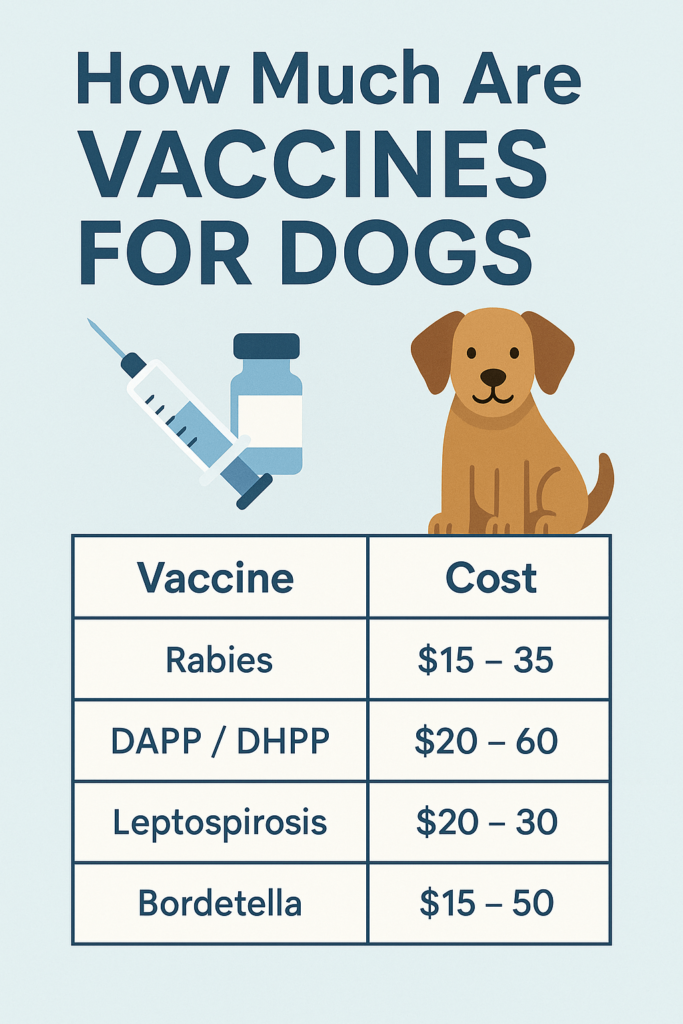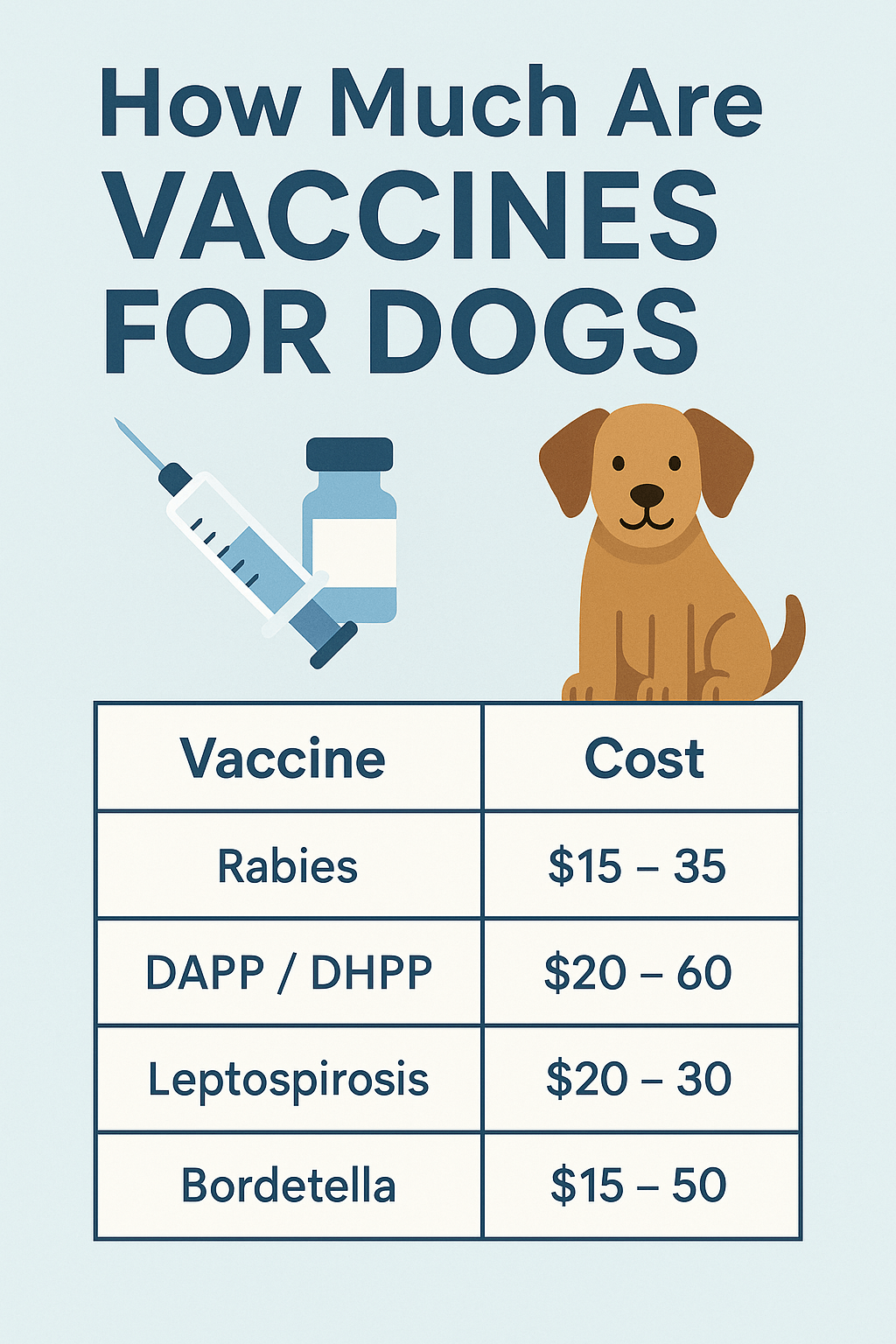How Much Are Vaccines for Dogs?
Vaccinating your dog is one of the most important steps you can take to ensure their health and well-being. Vaccines protect your furry friend from a range of potentially life-threatening diseases, such as rabies, parvovirus, and distemper. But how much do these vaccines cost, and what factors influence their pricing? While the expense of dog vaccines can vary depending on location, veterinary clinic, and the type of vaccine, understanding the costs involved will help you plan and prioritize your pet’s healthcare needs. In this guide, we’ll explore everything you need to know about dog vaccines, including average costs, additional expenses, and tips for making vaccinations more affordable.
Expert Insight on Pet Vaccinations
“Vaccinations prevent your pet from contracting contagious diseases. Some areas offer vaccinations for specific diseases that are prevalent or that your pup is at high risk for. However, a core set of vaccinations is given to puppies beginning at 6 to 8 weeks of age.”
Factors That Affect the Cost of Dog Vaccines
The price of dog vaccines isn’t fixed—it depends on several variables that can significantly impact the final bill. Being aware of these factors helps you anticipate costs and make informed decisions about your dog’s care.
Geographic Location:
Veterinary costs tend to be higher in urban areas compared to rural regions due to differences in overhead expenses and demand.Type of Vaccine:
Core vaccines, such as rabies and distemper, are generally more affordable than non-core vaccines like those for Lyme disease or kennel cough.Veterinary Clinic Fees:
Prices can vary widely between clinics, with luxury or specialty practices often charging more than local animal hospitals.Dog’s Age and Size:
Puppies require a series of vaccines, which can add up quickly. Larger dogs may also incur higher costs for certain medications or dosages.Frequency of Vaccinations:
Booster shots are needed periodically to maintain immunity, contributing to long-term vaccination costs.
Understanding these factors allows you to budget effectively and choose the best options for your dog’s needs without overspending.

Average Costs of Common Dog Vaccines
While prices vary, knowing the typical costs of common dog vaccines can help you prepare financially. Here’s a breakdown of what you might expect to pay for essential immunizations.
Rabies Vaccine:
The rabies vaccine is mandatory in most areas and typically costs between $15 and $35 per dose.Distemper-Parvo Combo (DHPP):
This core vaccine protects against multiple diseases and usually ranges from $20 to $40 per dose.Bordetella (Kennel Cough):
Often required for boarding facilities, this vaccine costs around $10 to $25 per dose.Lyme Disease Vaccine:
Recommended for dogs in tick-prone areas, this vaccine generally costs between $20 and $40.Canine Influenza Vaccine:
Protecting against dog flu, this vaccine typically ranges from $25 to $50 per dose.
These figures provide a general idea of vaccination costs, but it’s always wise to check with your local vet for accurate pricing.
Check this guide 👉DAP Vaccine for Dogs: Best 7 Expert Tips!
Check this guide 👉Dog Cancer Vaccine: Best 7 Expert Tips!
Check this guide 👉Rabies Vaccine Side Effects in Dogs: Best 7 Expert Tips!
Core Vaccines | Non-Core Vaccines |
|---|---|
Rabies | Bordetella (Kennel Cough) |
Distemper-Parvo Combo (DHPP) | Lyme Disease |
Adenovirus (Hepatitis) | Canine Influenza |
Parainfluenza | Leptospirosis |
Required by law in most areas | Optional, based on lifestyle/risk |
Additional Costs Associated with Vaccinations
Beyond the cost of the vaccines themselves, there are other expenses to consider when budgeting for your dog’s vaccinations. These hidden costs can add up, so it’s important to plan accordingly.
Veterinary Exam Fees:
Many clinics charge an exam fee, which can range from $30 to $75, even if your dog is only visiting for vaccinations.Booster Shots:
Some vaccines require annual or triennial boosters, leading to recurring costs over your dog’s lifetime.Health Certificates:
If you’re traveling with your dog, you may need a health certificate, which can cost an additional $50 to $100.Pre-Vaccination Blood Tests:
Certain vaccines, like those for leptospirosis, may require blood tests beforehand, adding $50 to $150 to the total.Emergency Care for Reactions:
Rarely, dogs may experience adverse reactions to vaccines, requiring emergency treatment that could cost hundreds of dollars.
Factoring in these additional expenses ensures you’re fully prepared for the financial commitment of keeping your dog healthy.
Tips for Reducing the Cost of Dog Vaccines
Vaccinating your dog doesn’t have to break the bank. With a little research and planning, you can find ways to save money while ensuring your pet stays protected.
Visit Low-Cost Clinics:
Many communities offer low-cost vaccination clinics hosted by local shelters or nonprofits.Bundle Services:
Some vets offer discounts if you bundle vaccinations with other services, like wellness exams or parasite prevention.Look for Pet Insurance:
Certain pet insurance plans cover routine vaccinations, reducing out-of-pocket expenses.Join Loyalty Programs:
Some veterinary clinics offer loyalty programs or memberships that provide discounts on vaccines and other services.Avoid Unnecessary Vaccines:
Consult your vet to determine which non-core vaccines are truly necessary based on your dog’s lifestyle and risk factors.
By taking advantage of these strategies, you can make dog vaccines more affordable without compromising your pet’s health.
Signs Your Dog Needs Vaccines
Recognizing when your dog needs vaccines is crucial for maintaining their health and preventing outbreaks of contagious diseases. Look out for these indicators that it’s time to schedule a vet visit.
Puppy Age Milestones:
Puppies should begin their vaccination series at 6-8 weeks old, continuing every 3-4 weeks until they’re 16 weeks old.Missed Booster Appointments:
If your dog hasn’t received a booster shot within the recommended timeframe, they may need revaccination.Exposure to Other Animals:
Dogs frequently interacting with other pets, such as at dog parks or boarding facilities, may need additional vaccines like Bordetella.Travel Plans:
Traveling to new regions or countries often requires updated vaccines, including rabies and specific non-core immunizations.Signs of Illness:
If your dog shows symptoms of a preventable disease, consult your vet immediately to assess their vaccination status.
Staying vigilant about these signs ensures your dog remains protected throughout their life.
Understanding Vaccine Side Effects
While vaccines are generally safe, some dogs may experience mild side effects. Knowing what to expect can help you identify normal reactions versus potential complications.
Soreness at Injection Site:
Mild swelling or tenderness is common and usually resolves within a few days.Lethargy or Fatigue:
Your dog may seem unusually tired after receiving vaccines, which is typically temporary.Mild Fever:
A slight increase in body temperature can occur as the immune system responds to the vaccine.Loss of Appetite:
Some dogs eat less than usual for a day or two following vaccination, but this should improve quickly.Rare Allergic Reactions:
Severe reactions, such as difficulty breathing or facial swelling, require immediate veterinary attention.
Most side effects are minor and short-lived, but always monitor your dog closely after vaccinations.
Building Trust During Vet Visits
For many dogs, vet visits can be stressful experiences. Creating a positive association with vaccinations and check-ups makes future visits smoother and less intimidating.
Use Positive Reinforcement:
Reward your dog with treats, praise, or toys during and after vet visits to create a positive connection.Practice Handling at Home:
Regularly touch your dog’s paws, ears, and mouth to get them accustomed to being handled, similar to what happens during exams.Bring Familiar Items:
Bring along a favorite blanket or toy to provide comfort in an unfamiliar environment.Stay Calm Yourself:
Dogs pick up on their owner’s emotions—if you’re relaxed, they’re more likely to feel safe and secure.Schedule Frequent Visits:
Routine trips to the vet, even for minor check-ups, help desensitize your dog to the experience over time.
Building trust reduces anxiety and fosters a cooperative relationship between your dog and their healthcare providers.
Frequently Asked Questions About Dog Vaccines
Are dog vaccines mandatory?
Core vaccines like rabies are legally required in most areas, while others depend on your dog’s lifestyle and environment.
How often does my dog need vaccines?
Puppies need a series of vaccines starting at 6-8 weeks old, followed by boosters every 1-3 years for adult dogs.
What happens if I skip my dog’s vaccines?
Skipping vaccines increases the risk of serious illnesses, some of which can be fatal or spread to other animals.
Can I vaccinate my dog at home?
While some vaccines are available for home use, it’s safer to have a licensed vet administer them to ensure proper dosage and handling.
Why are some vaccines more expensive than others?
Factors like production costs, rarity of the vaccine, and regional demand influence pricing differences.
Investing in Your Dog’s Health Through Vaccines
Vaccinating your dog is not just a financial decision—it’s an investment in their long-term health and happiness. While the costs of vaccines can vary, understanding the factors that influence pricing and exploring ways to save money makes it easier to provide your pet with the protection they deserve. By staying proactive and informed, you can ensure your dog remains healthy, happy, and safeguarded against preventable diseases. Remember, the peace of mind that comes from knowing your beloved companion is protected is priceless.
Keeping Your Dog Safe This Summer: Best 7 Expert Tips! – Learn how to protect your pup from heatstroke, dehydration, and more this summer. Stay safe!
When Was Cat Food Invented? Best 7 Expert Tips! – Discover the history, key milestones, and evolution of cat food from scraps to scientifically balanced diets.
When Was Dog Food Invented? Best 7 Expert Tips! – Discover the origins, evolution, and milestones of dog food, and how it transformed pet nutrition over time.
Kintamani Dutch Shepherd Mix: Best 7 Expert Tips! – Discover the perfect blend of loyalty, agility, and charm with this unique hybrid. Learn expert care tips now!





